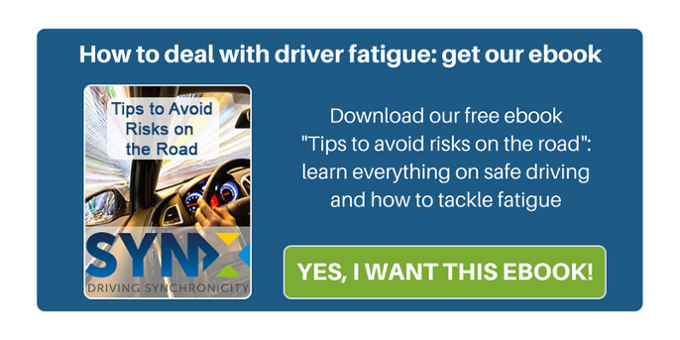
People are increasingly sensitized to the dangers of impaired driving; however, they don’t always factor in the dangers of tiredness behind the wheel and how to deal with driver fatigue, but concentrate rather on distracted driving or drink driving. It is fair to say that this is dangerous in just the same way as driving under the influence of alcohol, for example, and can lead to equally serious and dramatic consequences.
In this interesting infographic entitled "Driver fatigue kills 4,000 Europeans every year, created by Southside Motor Factors, we find some stark facts highlighting the worrying statistics of fatigue, factors contributing to driver fatigue, who is most at risk and what we could do in order to cope with it:

If we consider fleets and companies relying on driving and vehicles for the management of their activity, which might encompass truck drivers, company car drivers travelling long distances and contract workers, they are all seen as particularly susceptible to driver fatigue according to this infographic. The long hours of driving that might follow a mentally demanding workday, could easily lead to symptoms of fatigue. But professional drivers in general might be more prone to complacency and may tend to slip into a kind of “autopilot” attitude as they are behind the wheel for a very long part of the day.
According to the Road Safety Authority (RSA) of Ireland, in 2014 over one in ten motorists fell asleep behind the wheel. According to the same sources, motorists who drive as part of their work, and motorists who admit to driving after taking any amount of alcohol, had a higher than average incidence of falling asleep at the wheel (almost one in five fell asleep at the wheel).
According to studies by Brake, the road safety charity, particularly active in the UK, one in six crashes resulting in death or injury on major roads are fatigue-related and about 40% of fatigue-related crashes involve commercial vehicle drivers; often it is the largest vehicles on our roads that can cause the most harm in a crash.
In Ireland, both RSA and Health and Safety legislation are in agreement that employers are required and obliged to ensure vehicles are in a roadworthy condition, regular vehicle checks are completed and recorded and any defects rectified, as well as providing a safe place to work; and this involves respecting the rules regarding driving hours and assessing risks connected to workers through proper processes and the creation of policies—also targeting driver fatigue, of course.
Under UK legislation, companies have to "account for the health and safety of all their employees while at work" and are responsible for the consequences for this not being done. This "applies to all on-the-road work activities as to all work activities". Under the Management of Health and Safety at Work Regulations (1999), employers must assess the risks involved in staff use of the road for work and put in place all reasonably practical measures to manage driver fatigue. Vehicles are subject to UK and EU drivers’ hours rules, which translates to maintaining log books, recording hours of work and rest and ensuring medical assessments are up-to-date as required. Some specific vehicles such as vans and minibuses are exempt from EU regulations and only bound by much less rigorous GB domestic hours rules, hence why even more attention is needed.



